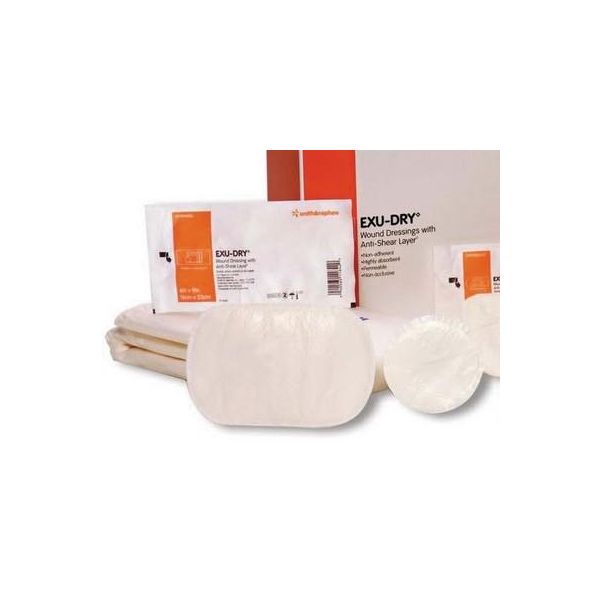Exu-Dry Pediatric Anti-Shear Absorbent Dressing 9" x 15" Toddler Arm/Leg Box/30
Description
EXU-DRY is a one-piece wound dressing made up of multiple layers. The children in your care can benefit from EXU-DRY's patented one-piece dressing with the Anti-Shear Layer which helps to minimize friction and shearing.
Features
- Outer Layer - High density polyethylene.
- Inner Layers - Highly absorbent rayon/cellulose blend.
- Anti Shear Layer - High density polyethylene.
- Wound Contact Layer - High density polyethylene.
Benefits
- EXU-DRY is a unique one-piece wound dressing designed to cover the wound with reduced friction, save nursing time and lower total dressing costs. EXU-DRY replaces non-adherent dressings, gauze and abdominal pads.
- Non-adherent to the wound, EXU-DRY is more comfortable for patients during and between dressing changes. EXU-DRY's Anti Shear Layer helps reduce shearing thus may help protect fragile granulation tissue. EXU-DRY's one-piece, multi-layer sealed construction eliminates frayed edges, loose threads and linting. EXU-DRY minimizes disruption to new granulation tissue.
- Highly absorbent, EXU-DRY helps reduce the risk of maceration and irritation to the wound and surrounding tissue. EXU-DRY wicks away drainage from the wound into the entire dressing, reducing the frequency of dressing changes.
- Non-occlusive, soft and pliable, EXU-DRY is available in a wide range of sizes and shapes to accommodate virtually any wound or body contour. Because EXU-DRY is permeable and non-occlusive, it can be used as a wet or dry dressing on clean or contaminated wounds.
- EXU-DRY is compatible with most topical agents, liquids and creams.
Indications
Indicated for exudate absorption and the management of partial to full-thickness wounds. Some typical wounds are:
- Ulcers (venous, arterial, diabetic)
- Pressure sores
- Donor sites
- Surgical incisions
- Surgical excisions
- Burns (1st and 2nd degree)
Precautions
- During the body's normal healing process, unnecessary material is removed from the wound which will make the wound appear larger after the first few dressing changes. If the wound continues to get larger after the first few dressing changes, consult an appropriate healthcare professional.
- Should any signs of irritation (redness, swelling, increased burning sensation), maceration (over-hydration of the skin), hyper-granulation (excess tissue) or sensitivity (allergic reactions) appear, discontinue use and consult an appropriate healthcare professional.
Step 1
Using a full absorbency EXU-DRY dressing, select a size slightly larger than the wound.
Step 2
Place onto wound.
Step 3
EXU-DRY dressings may be used as a Wet or Dry dressing:
- Dry: a variety of topical agents may be applied directly on the wound or buttered on to the dressing.
- Wet: submerge in liquid topical agent and gently squeeze out (do not ring out) excess fluid.
- Secondary dressing: May be used in combination with other products (calcium alginates, gels, foams, etc.) that have been used to pack a wound.
Step 4
Good Wound Contact is Essential: Secure in place with HYPAFIX◊ tape (window pane) or use a light wrap of roll gauze.
Step 5
We recommend daily dressing changes per your institutions protocols.





